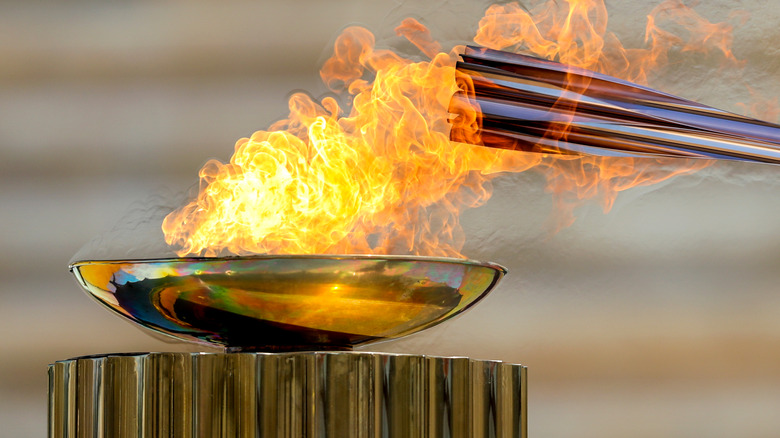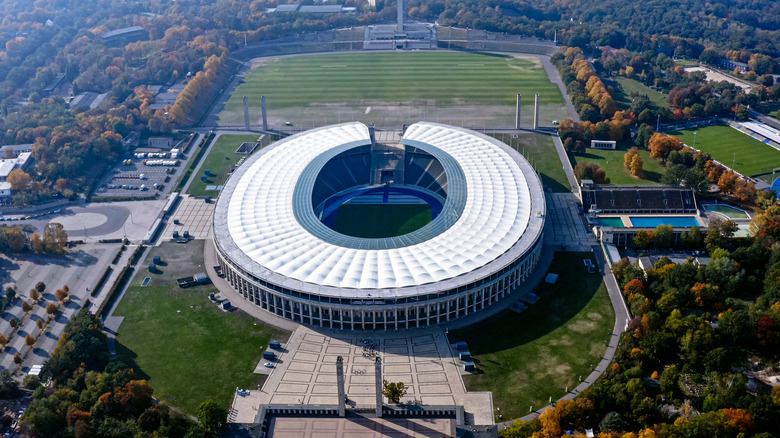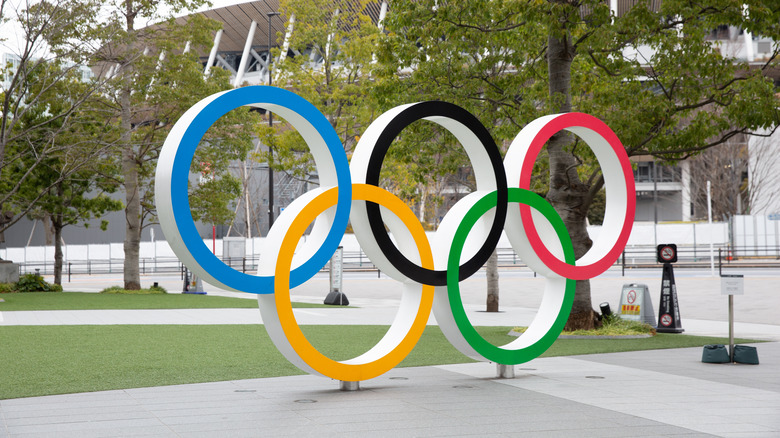The Surprising Origins Of The Olympic Torch Relay
When you envision Olympic Torch Relays throughout history, do you imagine that it started with the ancient Greeks? After all, the culture did start the sporting event, with the first Olympics held in Olympia, Greece, probably in 776 BCE, according to the Penn Museum. A cook named Koroibos won the sole contest, a stadion race, sprinting 600 feet along a track to victory. It is believed that the first 13 Olympics held the same event until 724 BCE when the Olympics started running competitions every four years.
Those games honored the Greek god Zeus, the father of all deities in the culture. Back in those ancient times, the games, which didn't include a sacred flame relay race, were quite different from today. To start off with, athletes often ran nude. Where that tradition started, no one knows for sure, but National Geographic recounted a story that attests the practice became common after one runner's loincloth loosened and he tripped over it, losing the race. After that, everyone seemed to discard their clothing. Some historians believe the practice goes back to initiation rites when young males entering manhood came naked to the ceremony.
The Olympic Torch Relay is inspired by the ancient Greek tradition of celebrating a sacred flame. Fire, after all, was brought down to Earth from the divine home of the gods, according to the myth of Prometheus. Other historians believe this tradition was started to honor Hera, queen of the Greek gods, said The Washington Post.
An Olympic tradition starts with propoganda
In many Greek sanctuaries, reported Ancient Olympics, a fire also burned constantly to honor various gods. Some cities even hosted a torch race — among them, the Panathenaic games, part of a religious festival honoring Athena, where this sacred fire kindled fires at other altars.
These ancient traditions inspired the 1928 Olympics, when Dutch architect Jan Wils designed a tower especially to house a continuously burning flame for the games held in Amsterdam. This fire greeted all who entered the Olympic Stadium.
The ceremony of moving the flame to the host cities through a relay race was the invention of a sports historian and the Olympic organizer for the 1936 Berlin Olympics (see the stadium above), Carl Diem, and its initial execution was controversial. Diem wished to link the modern-day event to its Greek roots by including a torch relay from Olympia to the host city, but the Nazis appropriated the idea as a propaganda tool, according to Athlon Sports. The ceremony intended to show the Aryan race's superiority and the route went through countries the Nazis hoped to dominate within a few years, including Greece, Bulgaria, Yugoslavia, and Austria.
The Associated Press quotes Tony Perrottet, author of "The Naked Olympics: The True Story of the Ancient Games": "Hitler took considerable personal interest in the ritual, and pumped funds into its promotion: The Nazi propaganda machine covered the torch relay slavishly, broadcast radio reports from every step of the route, and filled the Games with the iconography of ancient Greek athletics."
The Tokyo Olympics and its torch relay
The first relay ceremony opened to much excitement on July 20, 1936, in Olympia, Greece. Initial runner Konstantinos Kondylis lit his torch from a blazing cauldron and started a 12-day journey to Berlin, host of the summer games, according to History. The flame passed 2,000 miles, through seven countries and several other runners in stages. The final lag featured the 1931 Student World Champion in the 1500-meter, Fritz Schilgen, reported the Washington Post. Allegedly Schilgen was selected for the honor because of the beauty of his paces and his Aryan looks.
Germany hired legendary German director Leni Riefenstahl to capture it for the Nazi propaganda film "Olympia" (1938). Unhappy with footage from the original torch lighting in "Olympia" — she felt Kondylis' looks failed to capture the essence of a traditional torchbearer — she staged another version for the movie, reports History.
Since 1936, the relay has remained a regular activity. "Ironically, considering its repellent origins, the torch race has come to symbolize international brotherhood today, and remains a centerpiece of our own pomp-filled Olympic opening ceremonies," said Perrottet.
The 2021 Tokyo Olympics relay began on March 25 from the J-Village National Training Centre in Fukushima, according to the Olympics, and will last 121 days, visiting 47 locations. The torch should reach Tokyo on July 9, with the flame lighting the Olympic Stadium cauldron at the opening of the Olympics on July 23. (You can follow the torch's progress online.)


